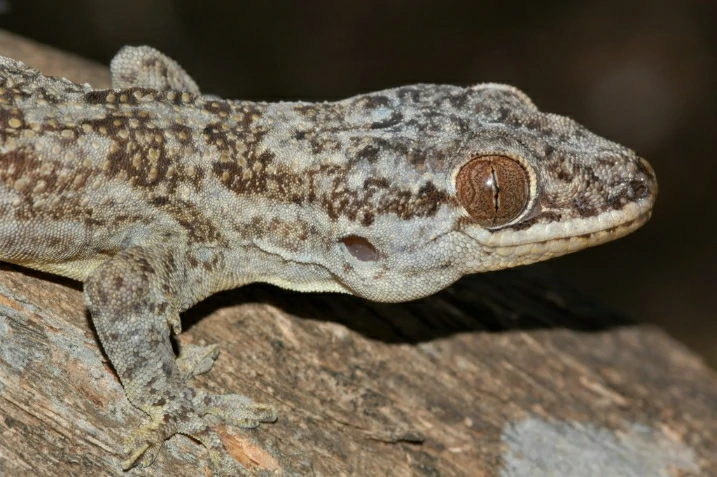If you’ve ever really looked at a gecko, you might’ve noticed something weird. They never blink. Their eyes are always open, big and shiny, no matter what they’re doing. It’s not that they’re staring at you. They just can’t close their eyes. So why don’t geckos have eyelids?
Most geckos don’t have eyelids because their eyes evolved to stay open for better vision, especially at night. Instead of eyelids, they have a thin, clear layer called a spectacle that protects their eyes but still lets light in. They clean this layer by licking it with their tongues.
It sounds strange, but for geckos, it works perfectly. Keeping their eyes open helps them hunt, climb, and survive in ways blinking animals can’t.
How Geckos See Without Eyelids
Geckos belong to a couple of lizard groups called Eublepharidae and Gekkonidae. Some have eyelids, some don’t. The ones without eyelids came up with a completely different way to protect their eyes.
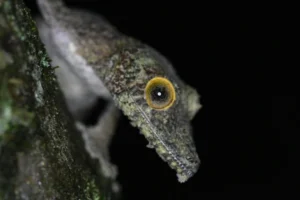
Their “eye covering” isn’t a real eyelid. It’s a clear, fixed layer called a spectacle. It covers the whole eye like a built-in contact lens. It keeps dust, dirt, and insects out but doesn’t block their view.
It’s like nature made them a permanent, clear shield, always protecting and never closing.
So, if they don’t blink, how do they keep their eyes clean?
How Geckos Clean Their Eyes
Here’s the cool part: geckos use their tongues.
You’ll see them pause, flick out their long tongues, and swipe across their eyes. It’s not just cute. It’s important. That tongue wipes away dust, pollen, and tiny insects that land on the spectacle.
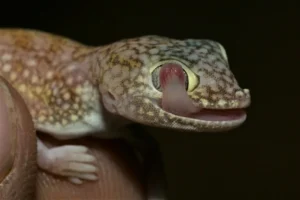
Think about it, if you couldn’t blink your whole life, you’d need another way to clean your eyes too. Geckos figured it out.
Their tongues are long, flexible, and a little sticky, so they can reach their eyes easily.
And since their eyes are always open, they clean them a lot, sometimes dozens of times a day. It might look funny, but it works really well.
Why Losing Eyelids Was Worth It
You’d think not having eyelids would be a problem, but for geckos, it’s actually a huge advantage.
Without eyelids, their eyes are always seeing light. That means they can notice movement instantly, even tiny movements. Perfect for hunting at night.
Nocturnal geckos, like tokay and house geckos, have some of the best night vision of any vertebrate. They can even see color in dim moonlight.
So by losing eyelids, they got something even better: eyes that are very sensitive to light and movement.
That helps them find food, dodge predators, and climb safely at night. Basically, they gave up blinking for super-vision.
Do All Geckos Lack Eyelids?
Not all geckos are the same. Some still have eyelids, some lost them completely.
Here’s how it breaks down:
-
Geckos with eyelids: Leopard geckos, African fat-tailed geckos.
-
Geckos without eyelids: House geckos, crested geckos, tokay geckos, day geckos.
So if you’ve seen a gecko blink, it’s probably from the first group.
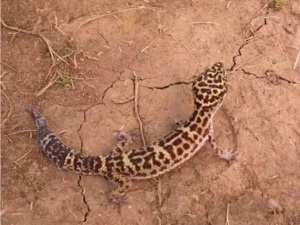
But most geckos (the ones you see on walls or trees) keep their eyes open all the time behind their clear spectacles.
This shows how geckos adapted to their lifestyles. Ground geckos with eyelids evolved in dusty places.
Wall and tree geckos evolved to keep their eyes open for faster reactions.
Why Geckos Clean Their Eyes So Often
Even with the spectacle, tiny bits of dust still land on their eyes. Geckos live in dusty, sandy, and insect-filled places, from forests to city walls.
If they didn’t clean their eyes, their vision would get blurry fast. So they constantly use their tongues like little windshield wipers.
They even lick more in dry, dusty areas. In humid places, they lick less. Basically, they adjust how often they clean their eyes based on the environment.
Can Geckos Sleep Without Eyelids?
Yes, and it’s kind of weird to watch.
When geckos sleep, their eyes stay open, but their pupils shrink to thin slits. That blocks most light but still lets them notice what’s around.
It’s like sleeping with one eye half-watching the world.
Some species hide in cracks, under leaves, or inside tree bark during the day. These spots keep their eyes safe from sun and predators.
So even without eyelids, they’ve figured out how to rest safely.
How the Spectacle Protects the Eye
The spectacle isn’t just a random layer. It’s part of the gecko’s body.
It grows from the same tissue that makes eyelids in other reptiles but fuses over the eye while the gecko develops.
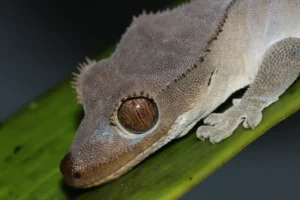
Under it is a thin layer of tears that keeps the eye moist and healthy.
In most animals, blinking spreads tears. In geckos, the tears flow automatically behind the spectacle. No blinking needed, but the eyes stay clean and hydrated.
Why Some Geckos Evolved to Keep Their Eyes Open
Millions of years ago, geckos had eyelids. But as some moved to trees, walls, and cliffs, seeing all the time became more useful than blinking.
Constant vision helped them avoid predators and catch fast insects. Over time, their eyelids disappeared, replaced by a clear scale that stays fixed.
This change made them faster, more alert, and better at surviving. Basically, geckos gave up eyelids to be full-time watchers at night.
How Geckos Keep Their Eyes Moist Without Blinking
You might wonder how their eyes don’t dry out. Most geckos live in humid places; jungles, caves, or damp walls. Moist air helps keep their eyes from drying.
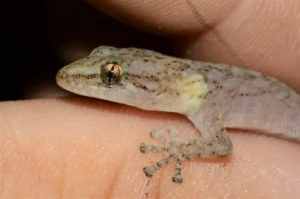
Tiny glands inside their eyes release tears that move between the eye and the spectacle. This keeps the surface wet all the time. Even though their eyes are always open, they rarely dry out.
Do Geckos Have Good Vision?
Yes, geckos have some of the best night vision in the animal world.
Their eyes are about 350 times more sensitive to light than human eyes. They can even see color in near-darkness, something cats can’t do.
That’s why you see geckos moving confidently on walls or ceilings at night. They can spot motion and shapes even in very dim light. It’s not about seeing clearly like humans, it’s about noticing everything that matters.
What Happens If the Spectacle Gets Damaged?
The spectacle is tough, but it can get scratched or infected, especially in captivity if humidity and cleanliness aren’t right.
If dirt or bacteria build up, the gecko’s eye can swell or look cloudy. In the wild, this almost never happens because natural moisture and constant tongue cleaning keep things balanced.
In captivity, keepers use the right humidity, clean water, and gentle handling to prevent problems.
Don’t try to clean a gecko’s eyes yourself, their tongue and tears do the job perfectly.
Why Geckos Lick Their Eyes More Than You Think
Most people notice a gecko licking its eyes sometimes, but they do it way more often than we think, sometimes dozens of times an hour, especially after eating or climbing through dust.
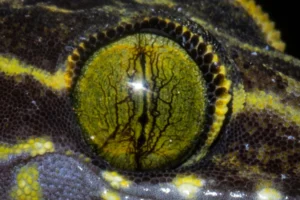
Each lick removes dust and spreads moisture evenly. It’s like a built-in eye-cleaning habit that never stops.
Some scientists think geckos also taste chemical signals in the air, checking for predators or prey. That single lick might do more than one thing.
What It’s Like to See the World as a Gecko
Imagine never being able to blink but seeing in light too dim for humans. That’s what geckos see.
Their pupils change a lot; wide at night, thin slits in bright light. Some, like tokay geckos, even have multiple pupil openings during the day for depth and clarity.
Everything about their eyes (the spectacle, the no-blink system, the tongue cleaning) works together like a precision tool. A gecko’s eyes are survival tools, not just for seeing.
Do Baby Geckos Have Eyelids When They Hatch?
Baby geckos from eyelidless species are born with clear spectacles already in place.
Their tongues are ready from the start, and they’ll lick their eyes within hours of hatching.
It’s instinct. From the beginning, they already know how to take care of their always-open eyes.
Frequently Asked Questions
Do all geckos have eyelids?
Do all geckos have no eyelids?
Why do geckos lack eyelids?
Most geckos lack eyelids because their eyes evolved to stay open for sharper night vision and quicker reactions while hunting.
Instead of closing their eyes, they have a clear protective scale covering the surface, which keeps the eye safe and moist. And since they can’t blink, they use their tongue to gently lick the eye clean.
Conclusion
Geckos don’t have eyelids because they don’t need them. Their eyes evolved for a life that depends on constant awareness, night vision, and self-cleaning.
The spectacle keeps their eyes safe, the tongue keeps them clean, and their vision keeps them alive.
Next time you see a gecko staring (not blinking, not moving) remember, that stillness is power. Behind those glossy, always-open eyes is one of nature’s smartest survival designs.
Hi, my name is Ezra Mushala, i have been interested animals all my life. I am the main author and editor here at snakeinformer.com.

